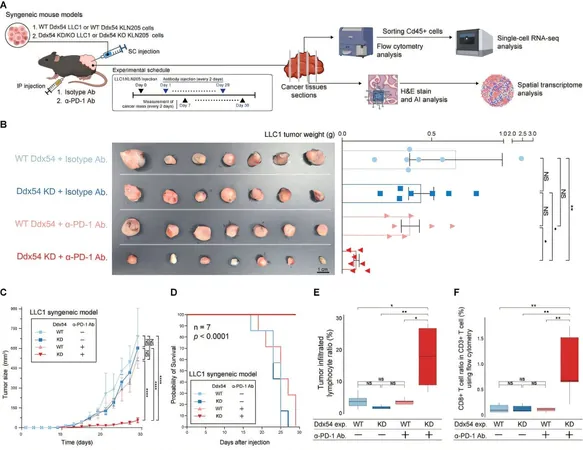
Groundbreaking Discovery in Immunotherapy Offers Hope for Lung Cancer Patients!
2025-04-08
Author: Wei
Groundbreaking Discovery in Immunotherapy Offers Hope for Lung Cancer Patients!
In a remarkable leap forward for cancer treatment, researchers have pinpointed a pivotal regulator that hinders immune response in lung cancer, potentially revolutionizing the effectiveness of immunotherapies. Despite the success of immune checkpoint inhibitors—therapies designed to empower immune cells to combat cancer—less than 20% of lung cancer patients see tangible benefits from these treatments. This stark reality underscores an urgent need for innovative strategies to enhance outcomes for both responders and non-responders.
Led by Professor Kwang-Hyun Cho from KAIST's Department of Bio and Brain Engineering, a dedicated research team has identified DDX54 as a crucial factor influencing the immune evasion of lung cancer cells. Their studies revealed that by inhibiting DDX54, the infiltration of immune cells into tumors significantly increases, substantially enhancing the effectiveness of existing immunotherapy treatments.
This exciting advancement has been licensed to BioRevert Inc., a startup launched by faculty from KAIST. Plans are in motion for this breakthrough to transition into a clinical setting, with trials anticipated to commence by 2028. The findings were recently published in the prestigious Proceedings of the National Academy of Sciences.
Traditionally, immunotherapy utilizing anti-PD-1 or anti-PD-L1 antibodies has shown promise in treating various cancers, yet the disheartening response rate limits the number of patients who can take advantage. To identify patients better suited for these treatments, the FDA recently approved tumor mutational burden (TMB) as a crucial biomarker; however, even tumors with high mutation levels can present an “immune-desert” phenotype, characterized by scant immune cell presence and, consequently, diminished treatment efficacy.
The implications of this research are profound, particularly in demonstrating the positive impact of DDX54 suppression on immune-desert lung tumors, which can traditionally resist immunotherapy. The team utilized a combination of transcriptomic and genomic data from lung cancer patients alongside advanced systems biology techniques to unravel the gene regulatory networks at play, zeroing in on DDX54 as a central player in immune evasion.
In animal models, disrupting DDX54 significantly boosted the presence of vital anti-cancer immune cells such as T cells and NK cells, leading to much-improved immunotherapy responses. Further analytical techniques, including single-cell and spatial transcriptomic analyses, revealed that targeting DDX54 encourages the maturation of T cells while weakening the infiltration of regulatory T cells and exhausted T cells that typically foster tumor growth.
The mechanism behind this breakthrough appears to involve DDX54 suppression, which affects crucial signaling pathways like JAK-STAT, MYC, and NF-κB, leading to a decrease in immune-evasive proteins like CD38 and CD47. This also diminishes the infiltration of pro-tumor monocytes while fostering the development of M1 macrophages, which play a pivotal anti-tumor role.
Professor Cho highlighted the significance of this research, stating, “For the first time, we have identified a master regulatory factor that enables immune evasion in lung cancer cells. By targeting DDX54, we’ve developed a new therapeutic strategy to induce responsiveness to immunotherapy in cancers that have previously shown resistance.” He emphasized that discovering DDX54 was made possible through the innovative integration of systems biology, combining information technology and biotechnology to unlock the complexities of cancer's molecular networks.
This promising discovery not only raises hopes for lung cancer patients but also opens new avenues for enhancing immunotherapy's effectiveness across various cancer types. Stay tuned as we continue to follow this developing story!



 Brasil (PT)
Brasil (PT)
 Canada (EN)
Canada (EN)
 Chile (ES)
Chile (ES)
 Česko (CS)
Česko (CS)
 대한민국 (KO)
대한민국 (KO)
 España (ES)
España (ES)
 France (FR)
France (FR)
 Hong Kong (EN)
Hong Kong (EN)
 Italia (IT)
Italia (IT)
 日本 (JA)
日本 (JA)
 Magyarország (HU)
Magyarország (HU)
 Norge (NO)
Norge (NO)
 Polska (PL)
Polska (PL)
 Schweiz (DE)
Schweiz (DE)
 Singapore (EN)
Singapore (EN)
 Sverige (SV)
Sverige (SV)
 Suomi (FI)
Suomi (FI)
 Türkiye (TR)
Türkiye (TR)
 الإمارات العربية المتحدة (AR)
الإمارات العربية المتحدة (AR)